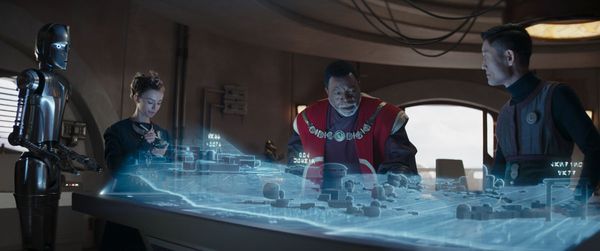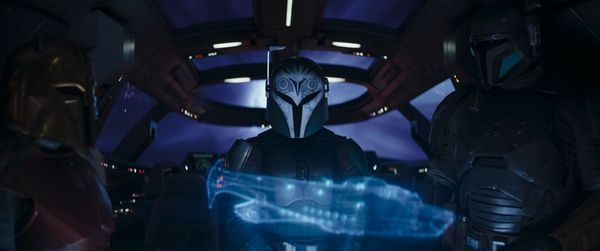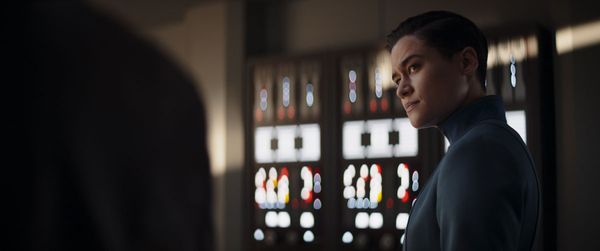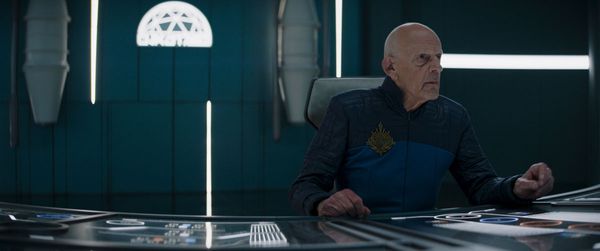
Whether referring to it as the Old Republic or the New within the "Star Wars" universe the Galactic Republic is understood to be a beacon of democracy and cooperation. A governing body formed by allied planets devoted to comity, the Republic represents the will of the people. In the movies, they're the good guys.
"The Mandalorian" and other "Star Wars"-related TV titles remind us that view is a matter of perspective. Time and again the adventures of Din Djarin (Pedro Pascal) remind us that being aligned with the Jedi and the Republic brings privileges that the average nobody cannot count on. The New Republic is still better than the Empire, in that it values freedom.
Independence is a different matter, as the citizens of planet Nevarro discovered when pirates rained terror down on its capital city in "The Mandalorian" episode titled "Chapter 21: The Pirate." Nevarro was once an outpost lorded over by bounty hunters. But once they cleared the place of rogue Imperials, the guild's leader Greef Karga (Carl Weathers) led the planet's transformation into a trade hub and assumed the title of High Magistrate. He did not petition for New Republic membership.

A nearby garrison of the New Republic Starfighter Corps could have assisted Nevarro but was denied permission by a Coruscant bureaucrat, Colonel Tuttle (Tim Meadows). He points out that the government is buried in aid requests from affiliated planets. Allowing a tiny independent rock to jump to the front of the line would be a bad look.
That jibes with scenes in earlier episodes where droids deliver files to office workers whose desks are already overloaded with assignments. This is not the shimmering side of the planet we're accustomed to seeing from the skyways above the surface or the opulent halls where leaders contemplate heavy political matters. They're dreary, overwhelmed places like the government buildings we know.
But then, this isn't what's supposed to thrill us in this third season of "The Mandalorian." Din Djarin's quest to wash away his apostate status is, at first. Then the season refocused as a redemption story for Bo-Katan Kryze (Katee Sackhoff), heir to Mandalore's royal throne, who proves her worth by earnng the respect of the Mandalorian's tribe and the allies who abandoned her.
Bo-Katan's relationship with Din Djarin and the Children of the Watch began as a contentious one, but after finding refuge and acceptance with the covert's leader, the Armorer (Emily Swallow), orders Bo-Katan to reunite their scattered people, Creed-adherents and civilians alike, to retake their abandoned homeworld. She quickly finds that walking in two worlds is no easy thing.
This discontinuous third season demonstrates that too. Maybe that was always destined to be the case with "The Mandalorian." As the show develops its mythology, it has become a jump point for spinoffs, including "The Book of Boba Fett" and the upcoming "Ahsoka."
If the movies establish that the Dark Side returns in greater strength than before ... specifying how that happens is reasonable.
This third season also firmly establishes the "Star Wars" TV flagship as a firmer bridge between "Episode VI: Return of the Jedi" and "Episode VII: The Force Awakens," albeit a touch more bravely than past seasons' explorations of the differences between the Jedi and Mandalorian faiths. Diving into spirituality and belief systems that don't exist is fundamentally safe.
Critically digging into the flaws of governance and bureaucratic blindness can be trickier, particularly in these sensitive times. There are "Star Wars" fans who crave autocracy and would love to vote a strongman into office. They also believe the Force is actually with them.
That said, Disney's top executives have insisted the franchise's aim is simply to tell entertaining stories everyone can enjoy. But if the movies establish that the Dark Side returns in greater strength than before Luke Skywalker, Han Solo, Princess Leia and Lando Calrissian knocked it out in "Return of the Jedi," specifying how that happens is reasonable.

Series creator Jon Favreau and his co-writers Dave Filoni and Noah Kloor could have answered those questions with fanciful scenarios. Instead, the subplots point to reasons Earth-dwellers, Americans in particular, can understand: bureaucratic excess. Needlessly dehumanizing rules and protocols. Willful blindness to a malevolence that's organized, regrouping, and gaining strength.
Viewed in separate episodes they play like contextualizing background information, the "meanwhile" percolating behind Mando's gunslinging action. Placed together they show the morally upright New Republic to be a profoundly flawed house of cards that believes itself to be a shining fortress on a hill.
The show starts down this road in "Chapter 19: The Convert," which spends less time with Mandalorian concerns than it does on a separate and seemingly unrelated visit to Coruscant. There, we find that Imperial scientist Penn Pershing (Omid Abtahi) has been pardoned and newly integrated into a New Republic amnesty program for recovering goose-stepping Dark Side stans, including Elia Kane (Katy O'Brian), the right hand to Moff Gideon (Giancarlo Esposito).
Kane appears to have fully embraced the light side of the Force, which sets off the first set of alarm bells. The second ring upon seeing the New Republic's deficient method of integrating former Imperials into society. Besides placing them in spartan dormitories, they're buried in work that's beneath their competencies. Pershing, a genetics genius, is relegated to endless file-sorting in an anonymous department.

Their identities are scrubbed and replaced by numbers which, to anyone familiar with 20th-century history, should be chilling. Pershing introduces himself to his recovering Imperial compatriots as Amnesty Scientist L52. Elia goes by G68, and quickly gets Pershing to drop his guard.
During his daytime drudgery, Pershing discovers that the New Republic is destroying perfectly useful, salvageable equipment and technology simply because it used to be Imperial property. Proof that the government is wasting good resources in the same way that it wastes his talent is a double insult. So of course, when Elia offers to help him illegally secure Imperial lab equipment sent to be decommissioned – to serve the New Republic, naturally! – he agrees, sealing his downfall.
In "The Mandalorian," the New Republic's officers and executives have a naïve faith in overburdened systems and demonstrate benevolent arrogance. When Pershing's "betrayal" is discovered, for example, New Republic doctors "treat" him with an Imperial torture device known as a Mind Flayer. But since they're not bad people, they're not being injurious by using it.
The New Republic's assurance that they're in the right leaves them open to being infiltrated by Imperial loyalists like Kane, proven by the seventh and penultimate episode of this season: "Chapter 23: The Spies."
The New Republic's officers and executives have a naïve faith in overburdened systems and demonstrate benevolent arrogance.
But the previous, "Chapter 22: Guns For Hire," shows another exploitable vulnerability in the form of wealthy planets like Plazir-15 that can afford to hire protection – in this case, Bo-Katan's former forces – and leave the rest of the rabble to their own devices.
Plazir-15 is a verdant, domed paradise (ruled by a Duchess and Captain played by Lizzo and Jack Black, what else could you possibly want?) that brags it is "the outer rim's only remaining direct democracy." They enlist Bo-Katan and Din Djarin's help in neutralizing a few repurposed Imperial and Separatist droids that have shrugged off their programming and pose a danger to its citizens.
The department that oversees the droids' functioning could turn them all off but, as Christopher Lloyd's commissioner explains, the citizens voted against any interruption in droid services.
They can't live without them, he explained, because the droids provide the labor that allows Plazir-15's citizens to no longer work and "spend their days engaging in recreation, the arts, and participating in our direct democracy." Go ahead and ponder what that implies.

Plazir-15 is a pleasurable pitstop on the way to "The Spies," which ultimately establishes where the Mandalorians sit in the eternal conflict between the Republic and the Empire – or, rather, the entity set to rise from the wreckage of Emperor Palpatine's defeat, the First Order.
Delineating the differences between the fascist, murderous governments in the "Star Wars" universe and George Lucas' vision of a parliamentary constitutional republic should be simple. For the most part, it is. The New Republic defends its affiliated governments, respects their sovereignty and doesn't vaporize planets on a whim.
But its refusal to aid weaker neighbors demonstrates the foolishness of assuming that everything is fine and will continue to be fine as long as the "right" people are in charge. America made that mistake in 2016 and is still struggling to prevent it from worsening seven years later.
Elia's appearance heralded the return of Moff Gideon, who reappears this week to ambush Bo-Katan's troops, kidnap a major character and kill another. But she's also a harbinger of the way The New Republic will come undone from the inside. Her placement in an even higher position of authority than she was before shows how easily she insinuates her way into influential positions by committing evil acts masked as serving the greater good.
"Perhaps the leaders of Nevarro need to understand why becoming a New Republic signatory is valuable," Kane says in support of Colonel's decision to greenlight a rescue mission which, as the pilot making the request points out, sounds a lot like Imperial thinking.
As the season nears its conclusion, the situation for Mandalore's descendants looks grim. The seventh, eighth and ninth movies prove life for citizens in these star systems is about to get a lot worse.
But if there is a larger message Favreau is telegraphing through this story, it isn't a pessimistic vision of representative government. Rather, "The Mandalorian" writers return to the principle that binds all of "Star Wars" together. It's not the Force. It's the principle that the line standing between freedom and fascism is only as strong as the individuals deciding to unite against the darkness.
New episodes of "The Mandalorian" stream Wednesdays on Disney+.







